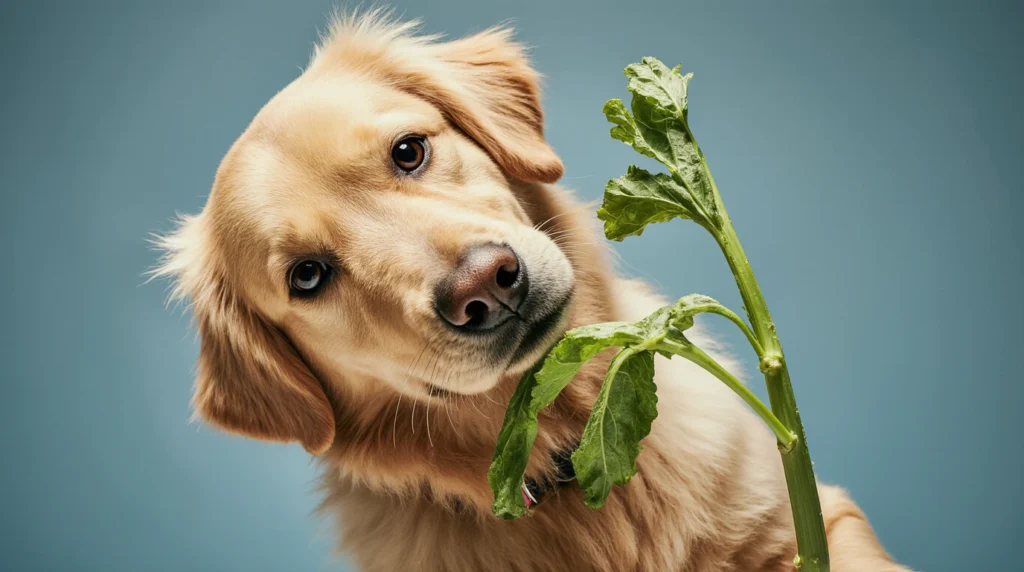Table of Contents
Can Dogs Eat Celery?
As pet parents, we often wonder if our furry companions can safely enjoy the same foods we do. When reaching for a crisp celery stick as a healthy snack, you might ask: can your dog benefit from this nutritious vegetable too? The relationship between dogs and human food is complex—some items are perfectly safe, while others can pose serious health risks.
Understanding what constitutes appropriate treats for our canine friends requires careful consideration of their unique dietary needs and digestive systems. While dogs thrive on complete and balanced commercial diets specifically formulated for their nutritional requirements, there’s room for healthy supplementation when done correctly.
Understanding Your Dog’s Nutritional Foundation
Dogs fed a complete and balanced diet receive all the essential nutrients they need for optimal health and vitality. Unlike humans, who benefit from varied fruit and vegetable consumption as part of a balanced eating plan, dogs don’t inherently require these additions to maintain their wellbeing. Their commercial dog food is scientifically formulated to provide the precise balance of proteins, fats, carbohydrates, vitamins, and minerals necessary for their species.
However, this doesn’t mean that fruits and vegetables have no place in your dog’s diet. When offered in moderation, certain plant-based foods can serve as healthy treats that provide variety, enrichment, and additional nutritional benefits. These treats become particularly valuable for pets struggling with weight management, as they often contain fewer calories than traditional commercial dog treats while providing satisfying crunch and flavor.
The key principle to remember is that any addition to your dog’s regular diet should be approached with caution and knowledge. Always consult your veterinarian before introducing new foods into your pet’s routine, as some human foods that seem harmless can actually be toxic to dogs. Professional guidance ensures you’re making choices that support rather than compromise your dog’s health.
Celery Safety: What Pet Owners Need to Know
Celery ranks among the vegetables considered safe for dogs, earning its place on the approved treat list maintained by veterinary nutritionists. This humble vegetable is frequently recommended by pet health professionals as an excellent treat option for dogs that need to lose weight or maintain a healthy body condition.
The nutritional profile of celery makes it particularly appealing for canine consumption. This green vegetable is remarkably low in fat and contains zero cholesterol, making it an ideal choice for dogs requiring dietary management. Beyond its low-calorie content, celery serves as an excellent source of dietary fiber, which supports healthy digestion and can help dogs feel satisfied after eating.
The vitamin and mineral content of celery provides additional health benefits for your furry friend. This vegetable contains significant amounts of vitamin A, which supports eye health and immune function. Vitamin C acts as an antioxidant, helping to protect cells from damage, while vitamin K plays a crucial role in blood clotting and bone health. The folate found in celery supports cellular function and tissue growth, while potassium helps maintain proper muscle and nerve function. Manganese, another mineral present in celery, contributes to bone development and wound healing.
An unexpected bonus of offering celery to your dog is its potential to freshen breath. The crunchy texture of this vegetable can help mechanically clean your dog’s teeth as they chew, potentially reducing plaque buildup and improving oral hygiene. While celery shouldn’t replace regular dental care, it can serve as a supplementary tool in maintaining your pet’s oral health.
Proper Portion Guidelines for Celery Treats
Understanding appropriate portion sizes is crucial when incorporating celery into your dog’s treat routine. Since dogs receive their complete nutritional needs from their regular food, celery should be viewed as a supplementary treat rather than a dietary necessity. This vegetable should never substitute for balanced meals or comprise a significant portion of your dog’s daily caloric intake.
The general guideline established by veterinary nutritionists states that treats, including celery, should not exceed ten percent of your dog’s daily diet. This percentage ensures that your pet continues to receive proper nutrition from their primary food source while enjoying the benefits of healthy treats.
Calculating the appropriate amount of celery for your specific dog requires consideration of several factors. First, account for any other treats your dog receives throughout the day, as the ten percent guideline encompasses all treats combined, not just celery. Second, determine your dog’s daily caloric needs, which varies based on factors such as age, size, activity level, and overall health status. This information is often available on your dog food packaging or can be obtained from your veterinarian during regular check-ups.
For practical application, a few small pieces of celery for a large dog or tiny cubes for a small dog typically falls within appropriate limits. However, individual needs vary significantly, making professional consultation valuable for establishing personalized feeding guidelines.

Potential Risks and Safety Precautions
While celery is generally safe for canine consumption, pet owners must be aware of potential risks and take appropriate precautions. The primary concern when feeding celery to dogs is the choking hazard it can present, particularly for smaller breeds or dogs that tend to gulp their food quickly.
The fibrous, stringy texture of celery can become problematic if dogs attempt to swallow large pieces whole. These pieces can become lodged in the throat or create blockages in the digestive system. To minimize this risk, always cut celery into bite-sized chunks appropriate for your dog’s size before offering it as a treat. This preparation method not only reduces choking hazards but also makes it easier to control portion sizes and ensure your dog thoroughly chews their treat.
Dr. Jerry Klein, the American Kennel Club’s Chief Veterinarian, emphasizes the importance of introducing any new food item slowly into a dog’s diet. Even safe foods can cause digestive upset if introduced too quickly or in large quantities. Begin with small amounts of celery and monitor your dog’s response over several days before gradually increasing the portion size.
Watch for signs of digestive sensitivity, including changes in stool consistency, excessive gas, vomiting, or decreased appetite. If any of these symptoms occur, discontinue celery treats and consult your veterinarian. Some dogs may have individual sensitivities to celery or difficulty digesting its fiber content, making it unsuitable despite its general safety profile.
Making Informed Decisions for Your Dog
Every dog is unique, with individual preferences, health considerations, and dietary needs that influence their treat requirements. While celery receives widespread approval from veterinary professionals as a safe treat option, it may not be the ideal choice for every pet. Factors such as existing health conditions, medication interactions, and personal preferences all play roles in determining the best treat options for your furry companion.
When in doubt about any dietary decisions for your dog, always consult your veterinarian for personalized guidance. These professionals understand your pet’s medical history, current health status, and specific needs, enabling them to provide tailored recommendations that support optimal wellbeing.
Beyond celery, numerous other fruits and vegetables can serve as healthy treat alternatives for dogs. Exploring various options under professional guidance helps ensure your pet enjoys variety while maintaining nutritional balance and safety. Remember that responsible pet ownership includes making informed decisions based on credible sources and professional expertise rather than assumptions or trends.
The journey of pet parenthood involves continuous learning about what best serves your dog’s health, happiness, and longevity. By approaching dietary decisions with knowledge, caution, and professional support, you create the foundation for a lifetime of healthy eating habits that benefit both you and your beloved companion.
There are no reviews yet. Be the first one to write one.

